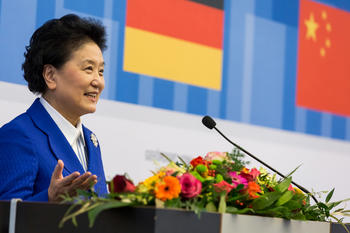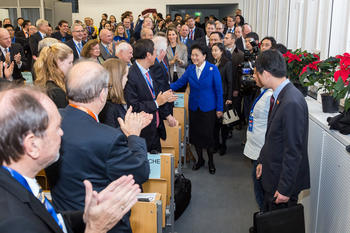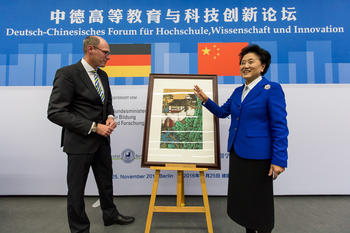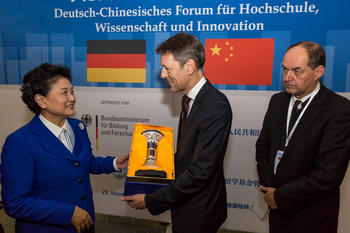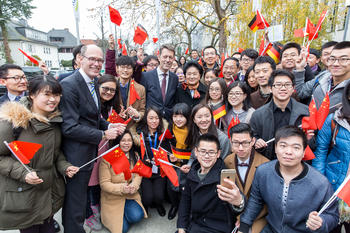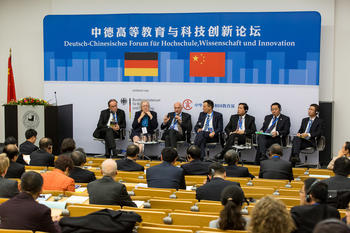Advancing Innovation Together
Liu Yandong, Vice Premier of China, spoke at the “German-Chinese Forum for Higher Education, Research and Innovation” at Freie Universität Berlin.
Dec 15, 2016
Liu Yandong, Vice Premier of China, spoke at the Henry Ford Building at Freie Universität.
Image Credit: Frederic Schweizer
Representatives of 27 universities in China and 41 in Germany traveled to attend the German-Chinese higher education forum.
Image Credit: Frederic Schweizer
The Chinese delegation’s gift was from Pan Gongkai, the president of the China Academy of Art. The calligraphy is from a classic Taoist text that highlights the connection between nature and culture.
Image Credit: Frederic Schweizer
The Vice Premier presents a gift to State Secretary Dr. Georg Schütte.
Image Credit: Frederic Schweizer
The Chinese Vice Premier received a warm welcome upon her arrival in Dahlem.
Image Credit: Frederic Schweizer
Dr. Klaus Mühlhahn, vice president of Freie Universität and a professor of Chinese studies, moderated the podium discussion entitled “Paths to Global Academic Leadership.”
Image Credit: Frederic Schweizer
It was a superlative event: More than 60 university presidents, vice presidents, party secretaries, and officials responsible for Chinese affairs from China and Germany were joined by a large number of high-ranking representatives of the business sector and aid organizations at last Friday’s German-Chinese Forum for Higher Education, Research and Innovation, held at Freie Universität.
Guests included Professor Peter Strohschneider, President of the German Research Foundation (DFG); Dorothea Rüland, Secretary General of the German Academic Exchange Service (DAAD); and Liu Jinghui, Secretary-General of the China Scholarship Council (CSC). One particular highlight was the visit paid by Liu Yandong, Vice Premier of China, who gave a detailed speech on the successes of the long-standing partnership between Germany and China and stressed her desire to strengthen and further expand the cooperation between the two countries.
Chinese flags waved enthusiastically when the convoy of black sedans rolled up in front of the Henry Ford Building in Dahlem: A number of Chinese students and doctoral candidates from Freie Universität had turned out for the event and stood in a line, giving the Chinese Vice Premier a warm welcome. Liu had taken the cooperation project between host institution Freie Universität, the German Federal Ministry of Education and Research (BMBF), the China Scholarship Council (CSC), the Chinese Ministry of Science and Technology, and the Chinese Ministry of Education as an occasion to visit Freie Universität. She praised the Chinese-German partnership’s past successes and called for more intercultural cooperation in the areas of education and research. Her speech was part of an extensive two-day program during which decision makers from both countries discussed successes and challenges as well as ideas for future bilateral cooperation projects between Germany and China.
The fact that Freie Universität was chosen as the venue for this forum – as it had been for the opening of the German-Chinese Year of Science and Education , in 2009 – is due to the university’s strong academic engagement in China: The university signed a partnership agreement with Peking University back in 1981. It was one of the very first German-Chinese higher education agreements, and has given rise to many other cooperative initiatives in research and teaching activities since then. “The scale of the German-Chinese higher education forum is an impressive testimonial to the importance and dynamism of German-Chinese cooperation in scholarship, science, and research. It also makes it clear that there is still a wealth of untapped potential for cooperation between us,” said Professor Peter-André Alt, the president of the university, during his welcoming remarks to kick off the event. Together with his colleague Professor Lin Jianhua, the president of Peking University, he had signed the agreement establishing the Beijing-Berlin PostDoc Fellowship the day before – a program aimed at outstanding junior scholars and scientists in the area of interdisciplinary area studies, data science, and digitization. The new initiative will give fellows access to both Berlin and Beijing as research sites for two years.
In the afternoon, visitors streamed in for the eagerly awaited remarks by the Chinese Vice Premier. In the packed lecture hall, which was decorated with bright red poinsettias, Liu’s visit brought a standing ovation. She was welcomed by Professor Peter-André Alt, the president of the university, who also greeted State Secretary Georg Schütte of the BMBF. He was attending in the place of German Federal Education Minister Johanna Wanka, who had had to cancel her planned speech on short notice for health reasons.
In his remarks, Schütte highlighted China’s outstanding importance in the field of academia. “It is a great honor that Liu Yandong is spending part of her visit to Germany here with us,” he said, adding that the forum offered an opportunity for “open dialogue.” Schütte had special praise for the extensive contact in the area of education and research between China and Germany. He called China “the most important cooperation partner for German higher education institutions in Asia” and explained that the country was currently hosting about 8,000 German exchange students every year, while about 30,000 Chinese students came to Germany to study each year in return. Schütte said that the expansion of the university’s range of English-language degree programs had been particularly helpful in boosting student mobility, making it an important part of academic exchange activities, and that future plans called for further support in this area.
He also praised the Chinese government’s ambitious plans to further strengthen and expand the research landscape in China. “No other country spends as much on research and development. One in every five scholarly and scientific articles worldwide is now published by Chinese researchers,” Schütte said, adding that these developments were being followed with respect and interest in Germany. China and its educational institutions “rank very highly in the hearts of the German people,” he said. Cooperative activities between the two countries will continue to offer opportunities to benefit from each other’s expertise in the future – as part of the Excellence Initiative, for example. Among the factors that distinguish the research performed under the initiative is the fact that it is open and unrestricted, with no specifications at all in terms of content. Policymakers give researchers the benefit of the doubt, since no one can judge the quality of research better than top international researchers.
This text was originally published in German on November 25, 2016, in the campus.leben online magazine by Freie Universität Berlin.

